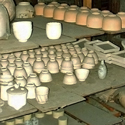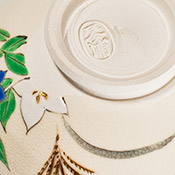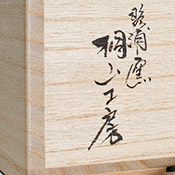For over a century, Kotoura-gama (Kotoura Kiln) has produced the finest pottery and porcelain utensils for use in Japanese tea ceremony. The kiln was officially established in 1910 (Meiji Era) by Wada Masaé, who fired his work in a massive five-chambered noborigama climbing kiln. This was a grand time in the kiln's history when the fires brought to life raku, tenmoku, celadon and other types of pottery. However, due to new environmental regulations and its close proximity to the ancient temples and shrines which line nearby Terramachi Street, the wood-burning kiln was closed in 1947.
Although the noborigama was dismantled decades ago, artifacts from that era in the kiln's history can be found all around Kotoura-gama. In a dark corner of the kiln, shelves of unfired tea cups, formed by its founder, are left respectfully where they were last placed - never to be touched by the flames that would bring them to life.
Today, the Wada family and a small staff of ceramists fire in gas and electric kilns on the same grounds where the noborigama once stood. The majority of the kiln's output, called kōbō-sakuhin, goes to serve the needs of tea ceremony utensil dealers and tea ceremony schools in Kyoto, Osaka and the surrounding region.
Kōbō-sakuhin are usually collaborative pieces fired by the kiln in larger numbers. There may be one artist responsible for forming, another for glazing and gold detailing, and a third for firing. Therefore, no one artist affixes a stamp to the ki-bako presentation box because kōbō-sakuhin proudly carry the banner for the kiln.
Kotoura-gama specializes mainly in enamel overglazed Kyo-yaki (Kyoto ware) porcelain. Seasonal blossoms framed by traditional Japanese patterns and accented with 24-carat gold are common themes on their skillfully handcrafted tea ceremony bowls, green tea cups and serving ware.







